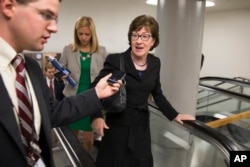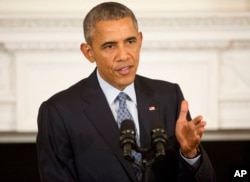Many U.S. lawmakers reacted cautiously to the successful conclusion of negotiations to forge the world’s biggest trading bloc. The Trans-Pacific Partnership would reduce trade barriers among 12 Pacific Rim nations that account for 40 percent of global economic output.
Republican Senator John McCain stood out among lawmakers by immediately and enthusiastically endorsing the pact.
"The TPP offers a historic opportunity to reduce trade barriers, open new markets, promote made in America exports, and keep American companies competitive in one of the most economically vibrant and fastest-growing regions in the world," McCain said in a statement.
Meanwhile, Independent Bernie Sanders, who is running for president as a Democrat, promptly proclaimed his fierce opposition, saying it will hurt consumers and cost American jobs.
“I will do all that I can to defeat this agreement,” said Sanders in a statement. “We need trade policies that benefit American workers and consumers, not just the CEOs of large multinational corporations.”
McCain and Sanders are exceptions to a wait-and-see approach that currently prevails on Capitol Hill. Many lawmakers approached by VOA said they needed time to read the accord and digest its provisions.
“I haven’t read it yet,” said Democratic Senator Ed Markey. “I have serious questions about it that I am going to have to have answered.”
'Complex agreement'
“It’s a complex agreement,” said Republican Senator Susan Collins. “None of us has seen the text yet, so it’s premature for me to reach a decision.”
Even so, senators who are generally supportive of freer trade are voicing apprehensions about TPP’s impact on the states they represent.
“I’ve been very concerned that the administration was not protecting domestic athletic shoe manufacturers like New Balance, which employs nearly a thousand people in my state,” said Collins of Maine. “So I will be looking specifically at the tariffs in that area.”
“I think it’s a good idea for us to export the things we grow and make to other parts of the world,” said Republican John Cornyn of Texas.
Cornyn, however, adds that some TPP provisions concern him, such as “limitations on our protection of our pharmaceutical drugs that we invest very heavily in here in the United States, and the rest of the world gets the benefit.”
Obama touts benefits
President Barack Obama said Tuesday he expects resistance to the pact on Capitol Hill, but is confident TPP’s benefits will win the argument.
"The TPP took five years to negotiate, and I want to get the best possible deal done for American workers and American businesses, and that is what we have achieved,” the president said at the Department of Agriculture. "This agreement makes us more competitive by eliminating 18,000 tariffs that are placed on America’s products in these other countries."
"This week marks an important step forward, but there is going to be a long, healthy process of discussion and consultation and debate before this comes to an actual vote,” Obama added.
Getting TPP to the president’s desk will require approval in both houses of Congress as lawmakers gear up for next year’s elections.
Earlier this year, many Democrats and a few Republicans opposed Trade Promotion Authority, or TPA, also known as “fast track,” which subjects trade pacts to simple majority votes with no amendments allowed. TPA ultimately was approved, but foreshadowed a bruising legislative battle over the Trans-Pacific Partnership.
“One of the problems with having passed ‘fast track’ is we can’t change the agreement,” said Collins. “I am not at all convinced that this is going to be a fair agreement.”
Republican Orrin Hatch, who helped shepherd TPA through the Senate, said TPP cannot survive many defections by lawmakers who support the accord in concept but object to some of its provisions.
“Every vote is a tight vote,” said Hatch.






